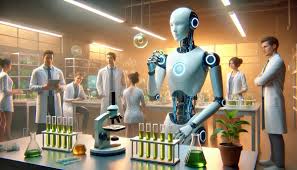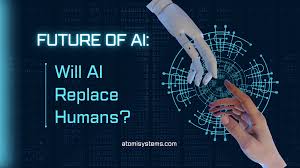
Will AI Replace Scientists Themselves?
Artificial intelligence is transforming nearly every corner of science—from discovering new drugs in days to decoding the mysteries of the universe faster than any human possibly could. But with AI systems now designing experiments, analyzing vast datasets, and even generating hypotheses, a bold question looms:
Will AI eventually replace scientists themselves?
It’s not just science fiction anymore. The answer isn’t simple—but it might change the future of knowledge forever.
🧠 What AI Is Already Doing in Science
Let’s start with what’s already happening. AI has been successfully integrated into many scientific fields, often doing work that would take humans years—or lifetimes.
Here are just a few examples:
🔬 Drug Discovery
AI tools like DeepMind’s AlphaFold predicted the structure of nearly every known protein, a task that once seemed impossible. Pharma companies now use AI to scan through millions of molecules in hours, cutting down the drug development timeline from a decade to months.
🧪 Experimental Design
Some AI systems can now propose and prioritize experiments, helping researchers decide which path is most likely to yield results. These systems analyze past data, spot patterns, and even adjust protocols in real time.
🌌 Space and Physics
NASA and CERN are using AI to sift through cosmic data, identify new celestial bodies, and detect particle collisions that point to new physics—tasks no human could do at scale.
🧬 Genetics and Genomics
AI helps analyze massive genome databases to identify disease risks, gene functions, and mutations that might lead to personalized treatments.
So yes—AI is already a powerful lab assistant. But could it become the lead scientist?
🤔 Can AI Truly “Think” Like a Scientist?
Here’s where it gets complex.
Science isn’t just about crunching numbers or running tests. It requires:
-
Creativity – dreaming up bold ideas
-
Curiosity – asking the “why” behind the “what”
-
Ethical judgment – deciding what should be done, not just what can be
-
Collaboration – building on centuries of shared human knowledge
AI can analyze and predict, but true scientific innovation often comes from a flash of intuition or a question no one else has thought to ask.
AI can simulate creativity with tools like ChatGPT or DALL·E, but many argue it’s more mimicry than invention.
🤖 Where AI Excels—And Where It Doesn’t (Yet)
✅ What AI Does Better:
-
Processes massive datasets instantly
-
Detects patterns invisible to humans
-
Optimizes experiments for speed and cost
-
Works 24/7 without burnout or bias (at least, in theory)
❌ What AI Still Struggles With:
-
Generating original, disruptive theories
-
Understanding broader context and ethics
-
Navigating social, political, and funding pressures in real-world science
-
Thinking across disciplines the way a human might connect biology to philosophy, for example
⚖️ Scientists vs. AI: A Partnership, Not a Battle
Most experts agree: AI won’t replace scientists—but scientists who use AI may replace those who don’t.
Think of AI as a powerful co-pilot—speeding up research, automating the grunt work, and uncovering insights. But the scientist remains at the wheel, steering the process, questioning the results, and ensuring that curiosity—not just code—drives the mission.
In fact, some institutions are already training “AI-native scientists” who work alongside machines from day one, treating algorithms like trusted colleagues.
🧬 What About “Robot Scientists”?
Believe it or not, they already exist.
One of the first was Adam, an AI-driven robot scientist that discovered new gene functions in yeast back in 2009. Its successor, Eve, helps find drug candidates for neglected tropical diseases.
These robots can:
-
Generate hypotheses
-
Design and run experiments
-
Analyze outcomes
-
Refine the next round—all autonomously
But they’re not replacing PhDs yet. They still need human oversight, creativity, and interpretation.
🧭 The Real Risk: Misplaced Trust
Here’s the bigger danger: not that AI replaces scientists—but that we overtrust it.
If flawed or biased algorithms guide research without proper checks, we risk:
-
Publishing false conclusions
-
Missing ethical red flags
-
Automating existing inequalities in who gets funding, credit, or protection
Human judgment is still critical to keep science open, inclusive, and grounded in truth—not just efficiency.
🚀 What’s the Future?
In the coming decades, we’ll likely see:
-
Self-driving labs powered by AI, testing ideas faster than any human team
-
AI collaborators that contribute meaningfully to papers and discoveries
-
Virtual scientists trained on centuries of knowledge to help solve new crises
But full replacement? That’s still far off—and perhaps not even desirable.
Final Thought
AI may someday outperform us in speed, precision, and even complex analysis. But science is more than solving problems—it’s about asking the right ones.
And for now, at least, humans are still the best question-askers the universe has.
